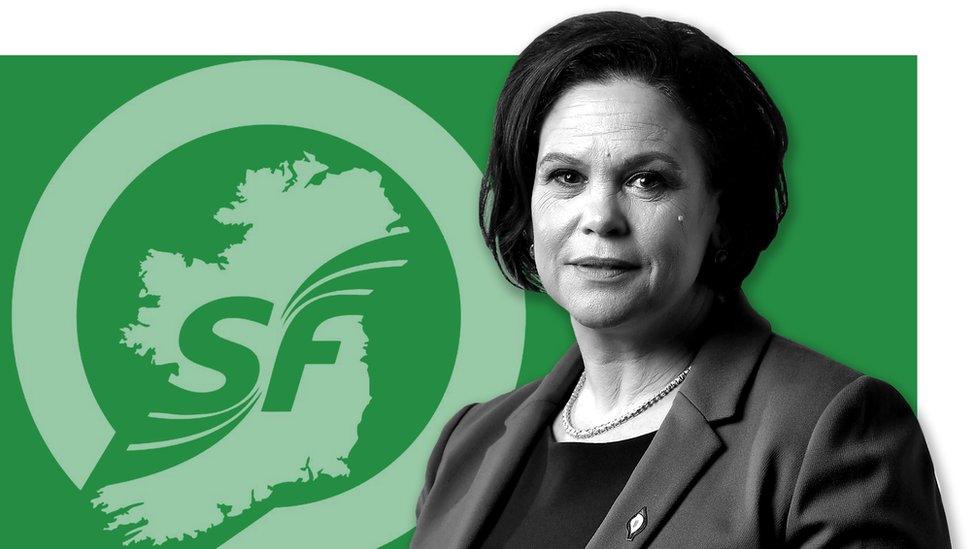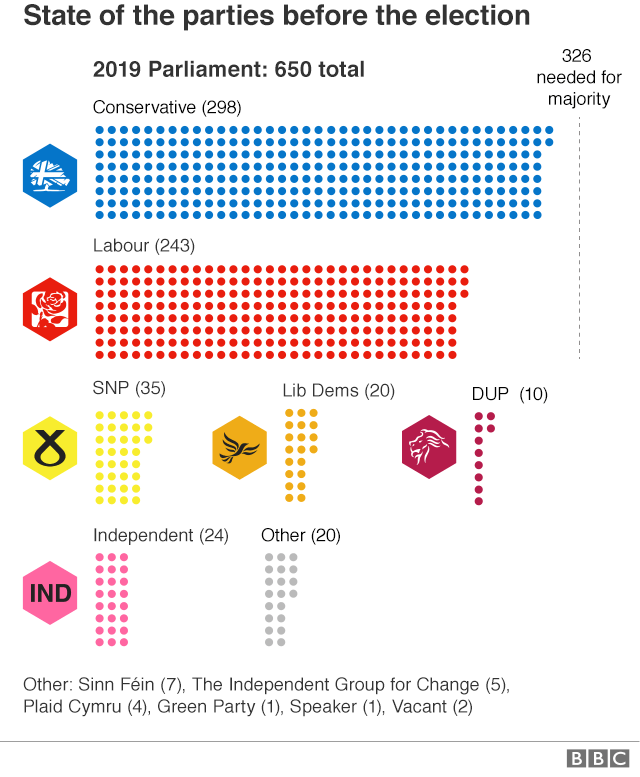General election 2019: A simple guide to Sinn Féin
- Published

Sinn Féin was the seventh biggest party in the House of Commons, with seven MPs out of 650 seats, when Parliament dissolved on 6 November.
They head into the general election as the second biggest party in Northern Ireland in terms of elected politicians.
They also have 21 TDs (members of the Irish Parliament), 27 Northern Ireland Assembly members and two MEPs - one from Northern Ireland and one from the Republic of Ireland.
Who is the leader?
Mary Lou McDonald has been the party's president since February 2018 when she took over from Gerry Adams. She will not be standing in the election as she is a TD in the Republic of Ireland.
Its vice-president, and leader in Northern Ireland, is Michelle O'Neill. She also will not be standing as she is a Northern Ireland Assembly member.
Five key election pledges
The party's main commitments in its manifesto include:
Securing a date for a referendum on Irish unity
Oppose Brexit
Restore the Stormont assembly but only with substantial reform, including of the petition of concern veto mechanism
Implement an Irish language act
No amnesty for British soldiers accused of unlawful killings during the Troubles


Where does it stand on Brexit?
Sinn Féin did not support Brexit and since the EU referendum in 2016 has campaigned for Northern Ireland to have what it calls "designated special status" within the EU, as well as strongly opposing a hard border in Ireland.
In practice this would see Northern Ireland remain within - or very closely aligned with - the EU.
Party president Mary Lou McDonald said Boris Johnson's deal was a "least worst option" which would "only mitigate the worst effects of Brexit".
It will stand aside in some constituencies in favour of other anti-Brexit candidates in this election.
What else does it stand for?
Sinn Féin is an Irish republican party, its core belief is that Northern Ireland and the Republic of Ireland should be united as a single independent republic.
The party sits on the left of the political spectrum - it is a democratic socialist party and is a member of the European United Left-Nordic Green Left in the European Parliament.
It broadly backs left-of-centre domestic policies and is a strong advocate of an Irish language act for Northern Ireland as well as a bill of rights.
Sinn Féin policy in a tweet
Allow X content?
This article contains content provided by X. We ask for your permission before anything is loaded, as they may be using cookies and other technologies. You may want to read X’s cookie policy, external and privacy policy, external before accepting. To view this content choose ‘accept and continue’.

What is Sinn Féin's history?
Sinn Féin was founded in 1905 by Arthur Griffith.
Its splits during the Irish Civil War in 1922 and again at the beginning of the Troubles in Northern Ireland in 1969 had dramatic effects on politics across the island of Ireland.
Why do Sinn Féin MPs not take their seats at Westminster?
The party has always held a policy of abstentionism when it comes to the House of Commons.
It believes the interests of the Irish people can only be served by democratic institutions in Ireland, not at Westminster.
It also opposes taking an oath of allegiance to the Queen, which all MPs are required to do in order to take their seats.
Sinn Féin adds its MPs are elected on an abstentionist mandate and by not taking their seats they are fulfilling the wishes of the electorate.
Do Sinn Féin MPs get a salary?
No, they are not entitled to salaries as they do not take their seats.
But they are allowed to claim allowances for the costs of staff, offices and travel.
In 2001 they were given permission to use facilities at Westminster including office space.
What is the link between Sinn Féin and the IRA?
For many years the party was the political wing of the IRA and supported the group's violent campaign aimed at bringing about a united Ireland.
A number of prominent Sinn Féin representatives, including MEP Martina Anderson, MLA Gerry Kelly and former MP and deputy first minister the late Martin McGuinness were once IRA members.
In the 1990s the party entered into peace talks and political negotiations that ultimately led to the Good Friday peace agreement in 1998, which helped end decades of violence and established the power-sharing institutions at Stormont.
In 2005, the IRA formally ordered an end to its armed campaign and in 2007 Sinn Féin committed to fully supporting policing and justice in Northern Ireland.
Sinn Féin is now committed to achieving Irish unification through purely peaceful means.